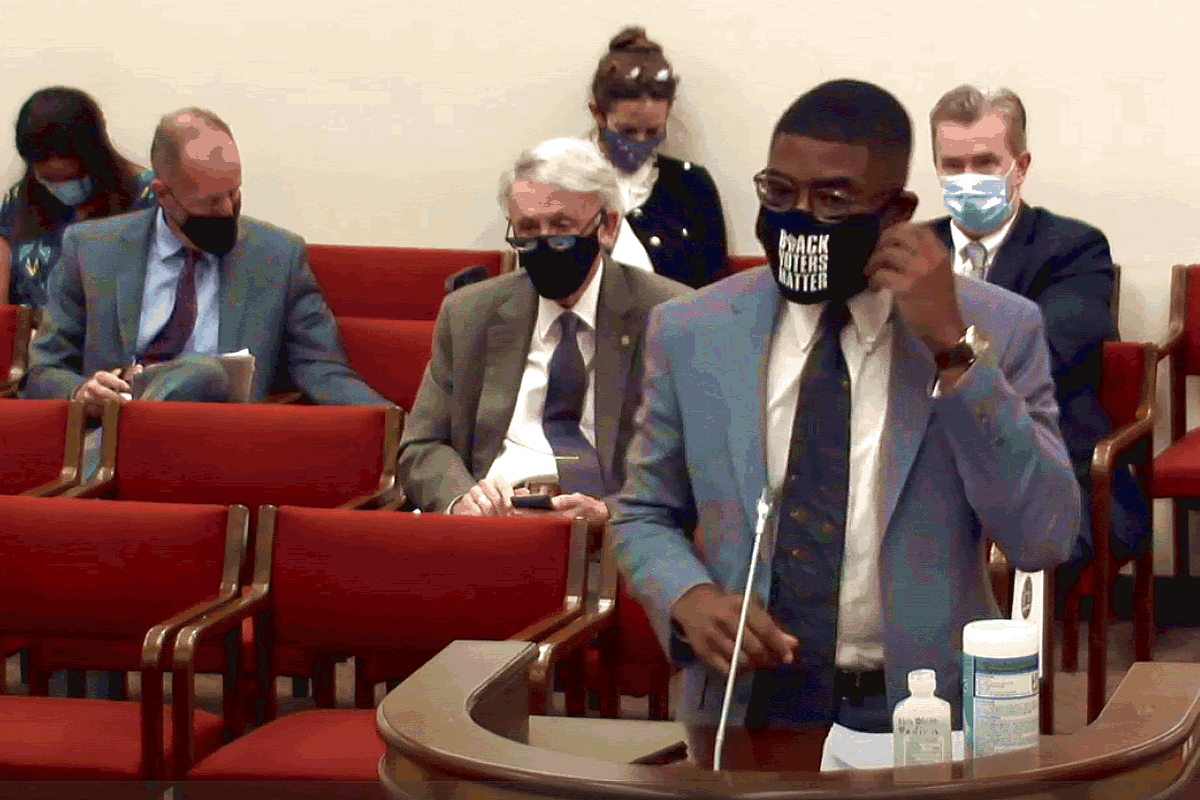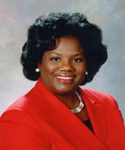
Activist Marcus McDonald of Charleston addresses a special House committee.
By Lindsay Street, Statehouse correspondent | By his account, Marcus McDonald was the youngest person in Room 110 of the Blatt Building at the Statehouse complex when he took the lectern this month.
The 23-year-old Charleston man also lacked law enforcement or attorney credentials — a hallmark of many speaking before the special House Equitable Justice System and Law Enforcement Reform Committee. But he said what few have in recent months of meetings.
“In South Carolina, it’s no secret we have a race problem,” McDonald said, after removing his black mask emblazoned with white, bold letters saying “Black Voters Matter.”

McDonald
McDonald, a substitute teacher and an organizer for Charleston Black Lives Matter, trekked to Columbia to speak on police training and tactics, just one aspect of a broad look at policing and criminal justice at the Statehouse. He participated in demonstrations this summer and has continued to organize more demonstrations. He said that during hours of testimony at a previous meeting, only one person directly said race was a problem.
Greenville Democratic Rep. Chandra Dillard said the subcommittee was “blown away” by McDonald. And she said he was right: No one was saying why the committee was meeting or what exactly is at the root of what they are trying to address.
Committee convenes for ‘substantive change’
Protests boiled in South Carolina on the last weekend of May in response to the death of George Floyd, a Black man who was in Minneapolis police custody when an officer kneeled on his neck for nearly nine minutes. Floyd suffocated to death. Police body cameras captured the incident on video. Floyd’s death was one of a spate of African American deaths at the hands of police officers and those saying they were enforcing the law.
By mid-June, House Speaker Jay Lucas, R-Hartsville, called for the formation of the House Equitable Justice System and Law Enforcement Reform Committee, made up of 18 bipartisan members. He asked for “substantive change” without defining it or saying directly why the committee was needed, except in response to “to address the urgent issues that our nation and state have been grappling with in recent weeks.”
In the opening remarks of the committee’s July 28 meeting, there was no direct mention of racial disparities in policing and the criminal justice system.

Simrill
“It’s important for equality and justice for all South Carolinians,” co-chair House Majority Leader Gary Simrill, R-Rock Hill, said then. “Making sure everything we do in South Carolina is for all.”
Subcommittees, too, have been largely devoid of exploring exactly what causes Black men to die at higher rates by police, why Black people are pulled over more and why African Americans face harsher sentencing for drug charges than white people.
“When you look at the statistics, a large majority of the people that are prosecuted for drug violations are minorities, now I don’t know why that is, but that’s what the statistics show,” said Summerville Republican Chris Murphy, who sits on the sentencing reform panel.
Some say focusing on police and the justice system keeps the spotlight (and the money) from going toward fixes that solve the root issues. Americans for Civil Liberties Union of South Carolina Executive Director Frank Knaack said the result will lead to “spinning wheels” and no real change amid an atmosphere shouting for justice.
Policy following protest
The full committee is expected to evaluate subcommittee-drafted bills after the Nov. 3 election. Among the items being explored is a reworked version of the House’s sentencing reform bill (H. 3322), which died on the floor amid the pandemic. The bill sought to create uniformity and funding in solicitor’s drug courts and reduce mandatory sentencing for drug violations. Also on tap for discussion: hate crimes legislation, civil asset forfeiture reform, body camera standardization and funding, and bans on no-knock warrants and chokeholds.
Sentencing reform and hate crimes legislation likely would have been reintroduced for the 2021 session, but have received renewed focus with committee work this summer and fall.
Bills from the committee could come as early as the December pre-filing — especially for items with previous filings. But police tactics and training bills will likely take until the beginning of the session in 2021, according to panel members.

Dillard
“Protest has to end in policy changes and that’s what we are doing and that’s what the civil rights era was built on — education, protest and policy,” Dillard said.
McDonald, the Charleston activist, said the goal of demonstrations around the state has always been to enact policy changes at the heart of deep racial disparities in the Palmetto State.
“The policy stuff is what people are asking for. The protests are the easy stuff and great visuals but the policy is where it happens,” he said.
But so far most of the policies being looked at are being touted as helping all people, not just specifically Black people.
“The all-lives approach works in the end because the laws have to apply to everyone but we have to focus on why we’re in this discussion in this first place, which is because of race,” McDonald said.
How to be an anti-racist at the state level
Two in 100 Black people in South Carolina are in prison, compared with four in 1,000 white people, according to the Prison Policy Initiative. But while focusing on police tactics and sentencing may seem like an effort to address the problem, advocates say it is only scratching the surface of a deeply-rooted issue.
“For a bill to be anti-racist, we need to admit that elements of the system are racist to begin with,” S.C. Appleseed Legal Justice Center attorney Bridget Brown said.
“Anti-racist” does not mean “not racist,” according to advocates. It means actively fighting racism, whether on the individual level or policy level.
“We need to be honest about the role race plays in the criminal justice system as a whole,” Brown said. “We need to be honest about the role race plays in the over-policing of certain neighborhoods. We need to be honest about the lifetime impact of a criminal record on a person despite having served their time or having received an expungement or a pardon. We need to be honest about those things so that the end result is an anti-racist bill.”
Knaack said there is little hope when yet another committee is called to focus on policing policy and training, and not the underlying issues causing crime.
“They have these generally small, mostly superficial reform packages they try to push through and pat themselves on the back and say, ‘We’ve made ourselves a less racist place’,” Knaack said. “We keep coming back to procedural justice but we have to come to a point where we realize that’s not a solution.”
He said police cannot provide housing and health care — two things that are directly linked to crime rates. Much of the policing and criminal justice woes felt by minority communities is tied back to the continued racial wealth gap, which puts the people on unequal ground from the start, Knaack said.
Knaack said creating antiracist policy will come from diverting some police resources toward programs that solve root causes of crime, and makes amends for previous policies that have worsened those causes over time. This idea has been summarized by the chant “Defund the Police” by protesters.
“It’s time to rethink what public safety should mean,” Knaack said.
So what’s an example of anti-racist policy? Take legalization of marijuana, Knaack said. Legalizing the drug is not anti-racist, he said, although marijuana laws disproportionately impact the black community. But legalizing the drug and diverting the money previously used to fund interdiction to repair communities negatively impacted by policy is anti-racist, he said.
"story" - Google News
October 23, 2020 at 10:54PM
https://ift.tt/2HA4hJR
BIG STORY: House justice panel seems to skirt race, critics say - Statehouse Report
"story" - Google News
https://ift.tt/2YrOfIK
https://ift.tt/2xwebYA
Bagikan Berita Ini















0 Response to "BIG STORY: House justice panel seems to skirt race, critics say - Statehouse Report"
Post a Comment